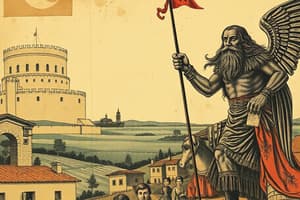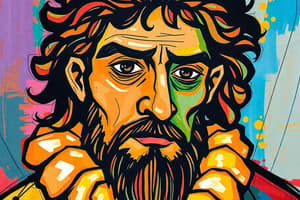Podcast
Questions and Answers
Which literary work is a significant epic poem from the Anglo-Saxon period?
Which literary work is a significant epic poem from the Anglo-Saxon period?
- *Beowulf* (correct)
- *The Canterbury Tales*
- *Paradise Lost*
- *Frankenstein*
Who is the author of The Canterbury Tales, a landmark work of Middle English literature?
Who is the author of The Canterbury Tales, a landmark work of Middle English literature?
- John Milton
- Geoffrey Chaucer (correct)
- Jonathan Swift
- William Shakespeare
During which period did Elizabethan drama, featuring playwrights like William Shakespeare, reach its peak?
During which period did Elizabethan drama, featuring playwrights like William Shakespeare, reach its peak?
- Anglo-Saxon Period
- Medieval Period
- Renaissance (correct)
- Victorian Period
Which of these works is John Milton most famous for?
Which of these works is John Milton most famous for?
Daniel Defoe is best known for which novel, a defining work of the 18th century?
Daniel Defoe is best known for which novel, a defining work of the 18th century?
Which literary movement is characterized by its emphasis on emotion, imagination, and individualism?
Which literary movement is characterized by its emphasis on emotion, imagination, and individualism?
Which author is known for writing Pride and Prejudice, a novel that satirizes social conventions?
Which author is known for writing Pride and Prejudice, a novel that satirizes social conventions?
Which novelist is famous for writing Oliver Twist, Great Expectations, and A Tale of Two Cities?
Which novelist is famous for writing Oliver Twist, Great Expectations, and A Tale of Two Cities?
Which author is known for the Modernist novel Ulysses?
Which author is known for the Modernist novel Ulysses?
Which literary period is characterized by metafiction, irony, and questioning of grand narratives?
Which literary period is characterized by metafiction, irony, and questioning of grand narratives?
Flashcards
English Literature
English Literature
Literature written in the English language, spanning from the Anglo-Saxon period to today.
Epic Poem
Epic Poem
A long narrative poem celebrating heroic deeds, like the story of a warrior battling monsters and dragons.
Allegory
Allegory
A literary work where characters and events represent abstract ideas or moral qualities.
Metaphysical Poetry
Metaphysical Poetry
Signup and view all the flashcards
Romanticism
Romanticism
Signup and view all the flashcards
Novels of Manners
Novels of Manners
Signup and view all the flashcards
Modernism
Modernism
Signup and view all the flashcards
Stream of Consciousness
Stream of Consciousness
Signup and view all the flashcards
Postmodern Literature
Postmodern Literature
Signup and view all the flashcards
Study Notes
- English literature includes diverse texts, such as poetry, prose, and drama, written in English.
- Spanning from the Anglo-Saxon period to today, it mirrors evolving social, political, and cultural contexts.
Anglo-Saxon Period (c. 450-1066)
- Old English literature features oral tradition, alliterative verse, and heroism and Christianity themes.
- Beowulf is a key epic poem, telling of Beowulf's heroic deeds.
- Religious poems by Cædmon and Cynewulf are also important.
- The Anglo-Saxon Chronicle documents English history in prose.
Medieval Period (1066-1485)
- The Norman Conquest of 1066 brought French language and culture.
- Middle English literature includes romances, allegories, and religious works.
- Geoffrey Chaucer's The Canterbury Tales offers a diverse view of medieval society.
- Sir Gawain and the Green Knight is a chivalric romance.
- William Langland's Piers Plowman provides social commentary.
- Popular drama included mystery, morality, and miracle plays.
Renaissance (c. 1485-1660)
- The Renaissance had a new interest in classical learning and flourishing arts and literature.
- The English sonnet was perfected during the Early Modern Period by William Shakespeare.
- Elizabethan drama peaked with Shakespeare, Christopher Marlowe, and Ben Jonson.
- Shakespeare's tragedies include Hamlet, Othello, King Lear, and Macbeth.
- Shakespeare's comedies include A Midsummer Night's Dream and Twelfth Night.
- Shakespeare's histories include Richard III and Henry IV.
- Francis Bacon is known for his essays.
- Sir Thomas More wrote Utopia.
- The 1611 King James Bible greatly impacted the English language.
17th Century
- Political and religious upheaval marked the 17th century, reflected in its literature.
- Metaphysical poets like John Donne, George Herbert, and Andrew Marvell explored complex topics using wit.
- John Milton's Paradise Lost retells the Fall of Man.
- The Restoration (1660-1700) saw theaters reopen and Restoration comedy rise.
- William Congreve and William Wycherley were prominent Restoration playwrights.
- John Dryden was a key poet, playwright, and critic.
18th Century
- The 18th century, the Enlightenment or Age of Reason, focused on reason and classical ideals.
- The novel became a key form with writers like Daniel Defoe (Robinson Crusoe), Samuel Richardson (Pamela), and Henry Fielding (Tom Jones).
- Jonathan Swift's Gulliver's Travels is a satire that critiqued society.
- The Graveyard School, including Thomas Gray and Edward Young, explored death and melancholy.
- Alexander Pope wrote satirical verse and translated Homer.
- Samuel Johnson was an important critic, lexicographer, and biographer.
Romantic Period (c. 1798-1837)
- The Romantic era focused on emotion, imagination, and individual experience.
- Key Romantic poets: William Wordsworth, Samuel Taylor Coleridge, Lord Byron, Percy Bysshe Shelley, and John Keats.
- Lyrical Ballads (1798) by Wordsworth and Coleridge began the Romantic movement.
- Romantic novels: Mary Shelley's Frankenstein and Sir Walter Scott's historical novels.
- Jane Austen wrote novels of manners, like Pride and Prejudice, that satirized society.
Victorian Period (1837-1901)
- The Victorian era featured industrialization, social reform, and moral earnestness.
- Victorian novels discussed poverty, class, and the impact of industrialization.
- Charles Dickens: Oliver Twist, Great Expectations, and A Tale of Two Cities.
- Charlotte, Emily, and Anne Brontë: Jane Eyre, Wuthering Heights, and The Tenant of Wildfell Hall.
- George Eliot (Mary Ann Evans) examined social themes in novels like Middlemarch.
- Important poets: Alfred, Lord Tennyson, Robert Browning, and Elizabeth Barrett Browning.
- The Pre-Raphaelite Brotherhood, including Dante Gabriel Rossetti and Christina Rossetti, valued beauty and medieval themes.
Modern Period (1901-1945)
- The Modern era was known for experimentation and rejecting tradition.
- Modernist novels used stream of consciousness and subjective experience.
- Key Modernist novelists: James Joyce (Ulysses), Virginia Woolf (Mrs. Dalloway), and Joseph Conrad (Heart of Darkness).
- T.S. Eliot: The Waste Land and The Love Song of J. Alfred Prufrock.
- Important Modernist poets: W.B. Yeats, Ezra Pound, and Wilfred Owen.
- George Bernard Shaw and Samuel Beckett innovated drama.
Postmodern Period (1945-Present)
- Postmodern literature has metafiction, irony, and questions narratives.
- Postmodern novelists often mix fiction and reality.
- Key Postmodern novelists: Samuel Beckett, John Barth, Thomas Pynchon, and Don DeLillo.
- Contemporary literature has diverse styles and voices, reflecting cultures.
- Contemporary authors: Salman Rushdie, Toni Morrison, Margaret Atwood, and Kazuo Ishiguro.
- Contemporary literature addresses identity, globalization, and social justice.
Studying That Suits You
Use AI to generate personalized quizzes and flashcards to suit your learning preferences.




